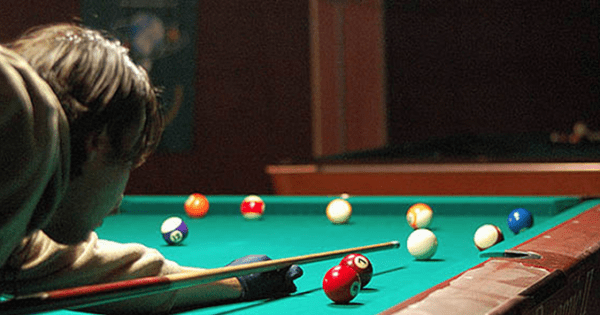Rack Em Up
by Trey Nosrac
My three favorite games are straight pool, jai alai and harness racing; only six living human beings can speak that sentence. This sentence also speaks to my social status and perhaps to my sanity.
During my eight undergraduate college years, I spent as much time in a pool hall as I did in any lecture hall. I watched pool, studied pool, practiced pool and played pool for money to defray tuition and room and board. My standard bet was $1 per game of nine-ball, or $5 for my favorite game — straight pool to 100 points. Pool had a pulse in those days. It was easy to find a game. Nobody got hurt financially. The competition was keen. Those were fun times.
Occasionally, a stranger with a large wad of money rolled into our little pool hall in search of a game. It was easy to see that this character knew the angles. This sharp stranger would not stay in our college town very long because nobody could or would play his big money game.
The idea of placing a $100 bill on the table for each game of nine-ball, or $500 for a game of straight pool, was a bridge too far. It always occurred to me that win or lose I would not have enjoyed big money games as much as our small money games.
This big fish was not about to swim in our little pond for $5 games that would take hours of his time. No hard feelings – like sharks and bluegills, we just merrily continued to swim in different water.
With the exception of fair racing, harness racing for owners and trainers is a lot like my pool hall. Participants have to play against sharp people with big bankrolls and first class performance optimizers. That’s life. Money talks in many things — business, pro sports, the stock market and politics.
If you swim in the shallow end of the harness race pool (small stable, small budget), resources are limited. Shoestring stables do not have a regime of veterinarian pre-race procedures, veterinarian post-race procedures, exotic supplements, blood work, joint injections or hyperbaric chambers.
High-tech horse maintenance procedures can ring up a tab. I recall a review of court transcripts I found on-line that involved litigation between a trainer and an owner. The numbers were staggering. In my world, we do not even have a budget for veterinarians. Legal limits, withdrawal times, therapeutic, whatever, some of us just want to race horse vs. horse without maintenance. We just want to bet on horses without considering their maintenance.
This makes a statement from a trainer that recently ran in HRU troublesome for many of us.
“We feed the best products and supplements as well as use every approved therapy for our horses with no cost reservations toward the benefit of health for each individual animal. I personally administer any and all treatments and therapies to every horse I train and race.”
Obviously, when another trainer drops a hay and oats horse in the box against my horse, there is an uneven playing field. Some will pay the price for attention to detail, fine-tuning and whatever, for them that is part of the deal. Other owners and trainers cannot, or will not, pay this price to participate. The poor gambler has no idea if a horse is fined-tuned or has not had a treatment in his life.
Just like my days in the pool hall, some people will not play a high stakes game, a game that places them under pressure or disadvantage.
There are conflicting philosophies at play in racing horses. Is it the job of a trainer to read medical charts, treat to the limit, spare no expense, and squeeze every drop out of a racehorse? Alternatively, is it the job of a trainer to have kind stewardship and let the horse do the work, and show the heart? As an owner, where are you going? What is winning worth?
Not easy is it?
Maybe an answer could be minor leagues of harness racing to separate the conflicting philosophies. A solid circuit in a non-slot machine state that is designed for younger horses that could offer relief for low budget players; it could also help keep the supply of horses inflated.
Let us call the new league the SHOW Circuit, (slower, hay, oats and water). The new league could have some basic guidelines.
The first one is speed. Once your horse breaks through a speed barrier, let us say a winning time of 1:58 for pacers and 2:00 for trotters, this horse becomes permanently ineligible. The horse has to step up to the majors or retire.
The SHOW circuit will try to keep things clean. If any man made substance appears in any amount in the test result, the owner will forfeit any purse money and return to the other circuit. This includes Lasix, a Tylenol, a Hershey Bar or a remnant of a single M&M. Veterinarians can only tend to horses with open wounds.
For owners that spend hard-earned money on yearlings that are not competitive in the major leagues of racing, sending the horse to a SHOW place would give these owners something to race for and somewhere to race. That two-minute trotter would give the connections some fun if they wished to be minor leaguers for a little while.
Who knows if a SHOW circuit has a future? One thing is for sure, if the financial picture for the low budget owners does not improve or we do not have a place to race our fringe contenders without maintenance, some of us will be racking them up for $5 a game.

















